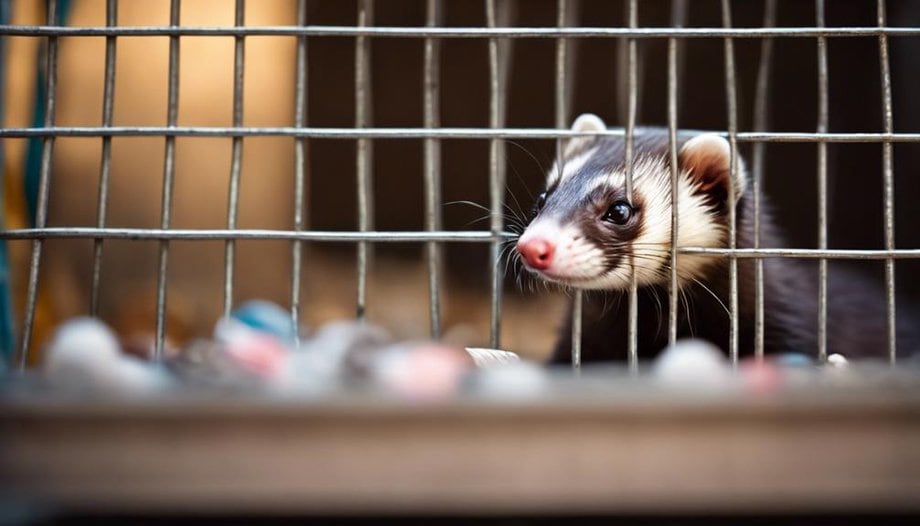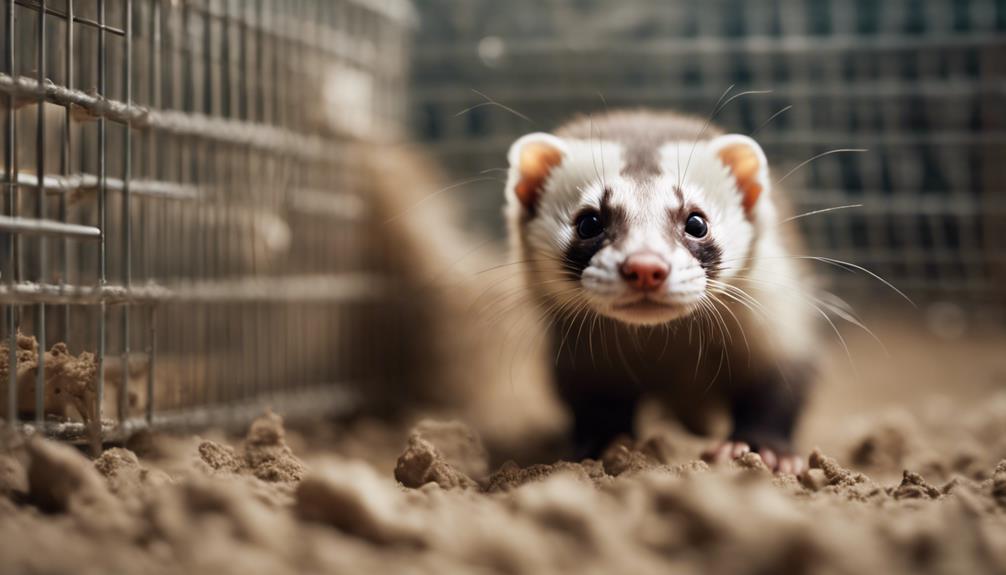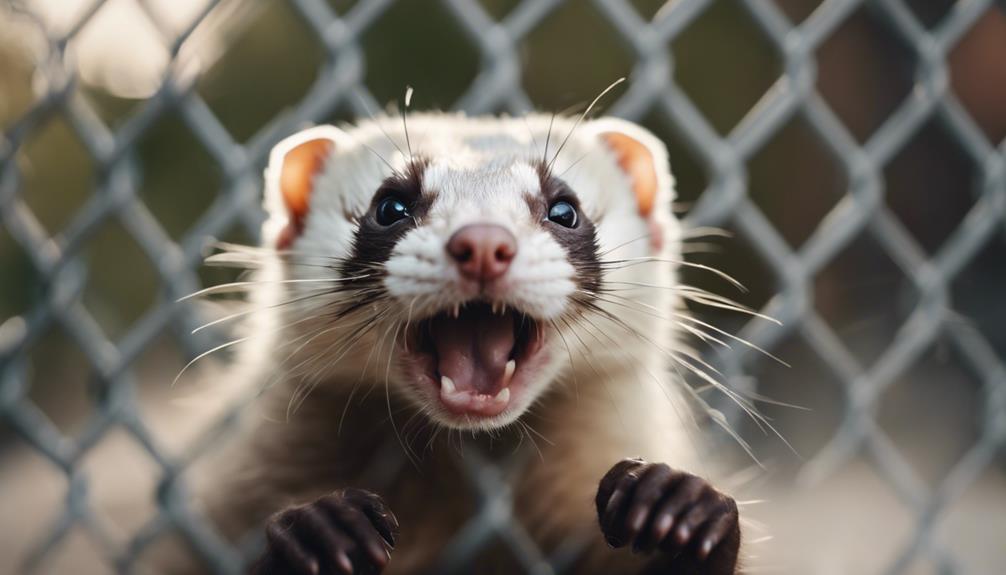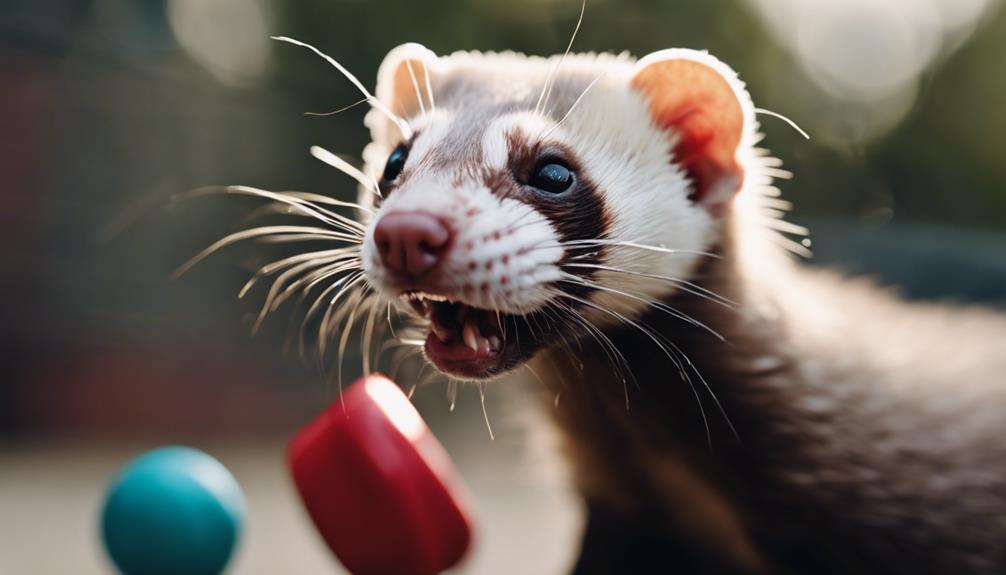What Are the Signs Your Ferret Is Unhappy With Its Habitat?

Signs Your Ferret Is Unhappy With Its Habitat:
- Decreased activity levels
- Excessive digging
- Other subtle cues indicating distress.
Make sure to monitor your ferret's behavior and environment closely to ensure its well-being.
Decreased Activity Levels
If a ferret displays a significant reduction in its usual playful behavior, it may indicate unhappiness with its habitat. One way to address decreased activity levels in ferrets is through playtime enrichment. Providing a variety of toys, tunnels, and interactive play opportunities can stimulate their curious nature and keep them engaged. Additionally, incorporating behavioral training sessions into their routine can help mentally stimulate them and prevent boredom.
The cage layout also plays a crucial role in promoting activity and happiness in ferrets. Ensuring the cage is spacious enough for them to move around comfortably and includes hiding spots and platforms for climbing can encourage natural behaviors. Moreover, offering different exercise options outside of the cage, such as playpens or ferret-proofed rooms, allows them to explore new environments and expend energy.
Excessive Digging or Scratching

Excessive digging or scratching in ferrets may signal dissatisfaction with their living environment and should be addressed promptly to ensure their well-being. Ferrets are natural diggers, but when this behavior becomes excessive, it could indicate boredom or stress. Providing mental stimulation and interactive toys can help alleviate this issue. Below are some enrichment ideas and behavioral training techniques to keep your ferret happy and engaged:
| Enrichment Ideas | Behavioral Training |
|---|---|
| Hide treats around the cage | Clicker training |
| Rotate toys regularly | Target training |
| Create tunnels and burrows | Positive reinforcement |
Aggressive Behavior Towards Cage

Aggressive behavior towards the cage by ferrets may indicate underlying issues with their environment or health that require attention. Ferrets are highly intelligent and social animals, so aggression towards their cage can be a sign of boredom, frustration, or even fear. To address this behavior, consider implementing cage enrichment ideas such as providing toys, tunnels, or hammocks to keep your ferret mentally stimulated. Additionally, ensuring that your ferret receives enough supervised playtime outside of the cage can help reduce aggression towards their living space.
Training techniques can also be beneficial in managing aggressive behavior towards the cage. Using positive reinforcement methods and consistency in training can help redirect your ferret's behavior in a more positive direction. Socialization tips, such as introducing your ferret to new environments and experiences gradually, can also help reduce aggression and increase their overall well-being.
Changes in Eating Habits

If a ferret is unhappy with its habitat, changes in eating habits can be a key indicator.
Look out for signs such as eating less food, refusing favorite treats, or noticeable weight loss.
These changes may signal that the ferret is distressed and needs attention to improve its well-being.
Eating Less Food
A noticeable decrease in food consumption could indicate that your ferret is unhappy with its habitat. Pay attention to your ferret's food preferences and monitor any changes in their eating habits. Ferrets might eat less if they're stressed or bored due to inadequate habitat modifications. Ensure your ferret's habitat provides enough space, hiding spots, and stimulation.
Additionally, review their playtime schedules and incorporate enriching activities to keep them mentally and physically engaged. If your ferret is eating less, it's essential to assess their environment and make necessary adjustments to improve their well-being. By addressing any issues promptly, you can help ensure your ferret's happiness and overall health.
Refusing Favorite Treats
Noticing a change in your ferret's behavior towards their favorite treats can be a telling sign of dissatisfaction with their habitat. Ferrets are known to be enthusiastic eaters, so if they start refusing their favorite snacks, it could indicate underlying issues. Here are some reasons why treat refusal can be a sign of unhappiness:
- Behavioral Problems: Treat refusal could be a manifestation of behavioral problems triggered by stress or discomfort.
- Favorite Snacks: Ferrets often show their mood through their favorite snacks, so a lack of interest in these treats may signal unhappiness.
- Mood Indicators: Changes in eating habits, especially related to preferred treats, can serve as mood indicators for ferrets.
Monitoring treat consumption and preferences is crucial in understanding your ferret's well-being.
Weight Loss Noticeable
Changes in a ferret's eating habits leading to noticeable weight loss can be a significant indicator of underlying health issues and dissatisfaction with its habitat. Behavioral changes such as decreased appetite or reluctance to eat can result in weight loss, impacting the ferret's overall well-being.
It's essential to monitor your ferret's weight regularly and consult a veterinarian if you notice any unexplained weight loss. To address this issue, consider making habitat improvements and introducing enrichment activities to stimulate the ferret's interest in food and encourage healthy eating habits.
Excessive Hiding or Avoidance

Showing a preference for secluded areas and actively avoiding interaction with its surroundings can indicate that a ferret is unhappy with its habitat. When a ferret excessively hides or avoids contact, it may be experiencing distress or dissatisfaction. Here are some signs to look out for:
- Decreased playfulness: A ferret that used to be energetic and playful but now spends most of its time hiding may be unhappy.
- Lack of curiosity: Ferrets are naturally curious animals. If a ferret shows no interest in exploring its environment, it could be a sign of unhappiness.
- Avoidance of human interaction: Ferrets are social animals that enjoy interacting with their owners. If a ferret consistently avoids human contact, it may be feeling stressed or uncomfortable.
Understanding these signs can help ferret owners address any issues with their pet's habitat, such as the need for more enrichment or adjustments to reduce stressors.
Unusual Vocalizations or Whining

Ferrets may express their discontent with their environment through unusual vocalizations or whining. These sounds can be a sign of underlying issues that need attention.
It's essential to pay attention to both behavioral changes and physical symptoms when deciphering your ferret's communication cues.
Behavioral Changes
Unusual vocalizations or whining in ferrets can indicate dissatisfaction with their habitat and should be addressed promptly by their owner. When a ferret displays these behaviors, it's crucial to consider the following:
- Mental Stimulation: Lack of mental stimulation or enrichment activities can lead to stress and unhappiness in ferrets.
- Social Interactions: Ferrets thrive on social interactions and playtime with their owner. A lack of these can result in feelings of loneliness and boredom.
- Environmental Enrichment: Providing a stimulating environment with toys, hiding spots, and opportunities for exploration can help keep ferrets happy and engaged.
Physical Symptoms
Exhibiting unusual vocalizations or whining can be a clear indication that a ferret is dissatisfied with its habitat. These behaviors are considered physical symptoms that could signal underlying health concerns.
When a ferret starts vocalizing more than usual or whining persistently, it may be experiencing discomfort or stress. It's essential to pay attention to these signs as they can also be stress indicators. Stress in ferrets can lead to various health issues if not addressed promptly.
Monitoring and addressing any physical symptoms promptly can help prevent further complications and ensure the well-being of the ferret. Seeking advice from a veterinarian when noticing these signs is recommended to rule out any potential health problems and improve the ferret's living conditions.
Over-Grooming or Self-Mutilation

Excessive grooming or self-injury can indicate dissatisfaction with their environment. Ferrets are prone to over-grooming or self-mutilation when they're stressed or unhappy with their living conditions. It's crucial for ferret owners to pay attention to these behaviors as they can signal underlying issues that need to be addressed promptly.
- Stress Indicators: Over-grooming or self-mutilation can be signs of stress in ferrets. Identifying and addressing the source of stress is essential for the well-being of the ferret.
- Coping Mechanisms: Ferrets may resort to over-grooming or self-mutilation as a way to cope with environmental stressors. Providing appropriate outlets for stress relief is vital in preventing these behaviors.
- Behavioral Modification, Environmental Enrichment: Implementing behavioral modification techniques and enriching the ferret's environment can help alleviate stress and prevent over-grooming or self-mutilation. Engaging toys, proper social interaction, and a comfortable living space can all contribute to a happier and healthier ferret.
Frequently Asked Questions
How Can I Improve My Ferret's Habitat to Prevent Excessive Hiding or Avoidance Behaviors?
To improve a ferret's habitat and prevent hiding or avoidance behaviors, focus on habitat enrichment and behavioral training. Adjust the cage layout, offer social interaction, and introduce engaging activities. Overcoming initial resistance may lead to a happier ferret.
Are There Any Specific Toys or Enrichment Activities I Can Provide to Prevent Aggressive Behavior Towards the Cage?
To prevent aggressive behavior towards the cage, ferret owners can provide interactive toys like puzzle feeders and incorporate enrichment activities into playtime routines. These additions can help keep ferrets mentally stimulated and reduce negative behaviors.
What Are Some Common Reasons for Changes in a Ferret's Eating Habits and How Can I Address Them?
Sometimes, a ferret's appetite waltzes to a different tune. Feeding preferences can sway; dietary adjustments may be needed. Behavioral changes call for environmental modifications. Observe, adapt, and the ferret's dining symphony shall play harmoniously once more.
How Can I Distinguish Between Normal Vocalizations and Unusual Vocalizations or Whining in My Ferret?
When trying to distinguish between normal vocalizations and unusual whining in a ferret, observing their body language is key. Behavior modification and socialization techniques can help address excessive vocalizations. Altering cage setup may also aid in creating a more comfortable environment.
What Are Some Possible Underlying Causes for Over-Grooming or Self-Mutilation in Ferrets and How Can I Address Them?
Excessive grooming or self-mutilation in ferrets can stem from stress, boredom, or medical issues. Behavioral therapy, medication, environmental enrichment, and socialization are key interventions. A vet should assess and recommend appropriate treatment to address these behaviors effectively.











